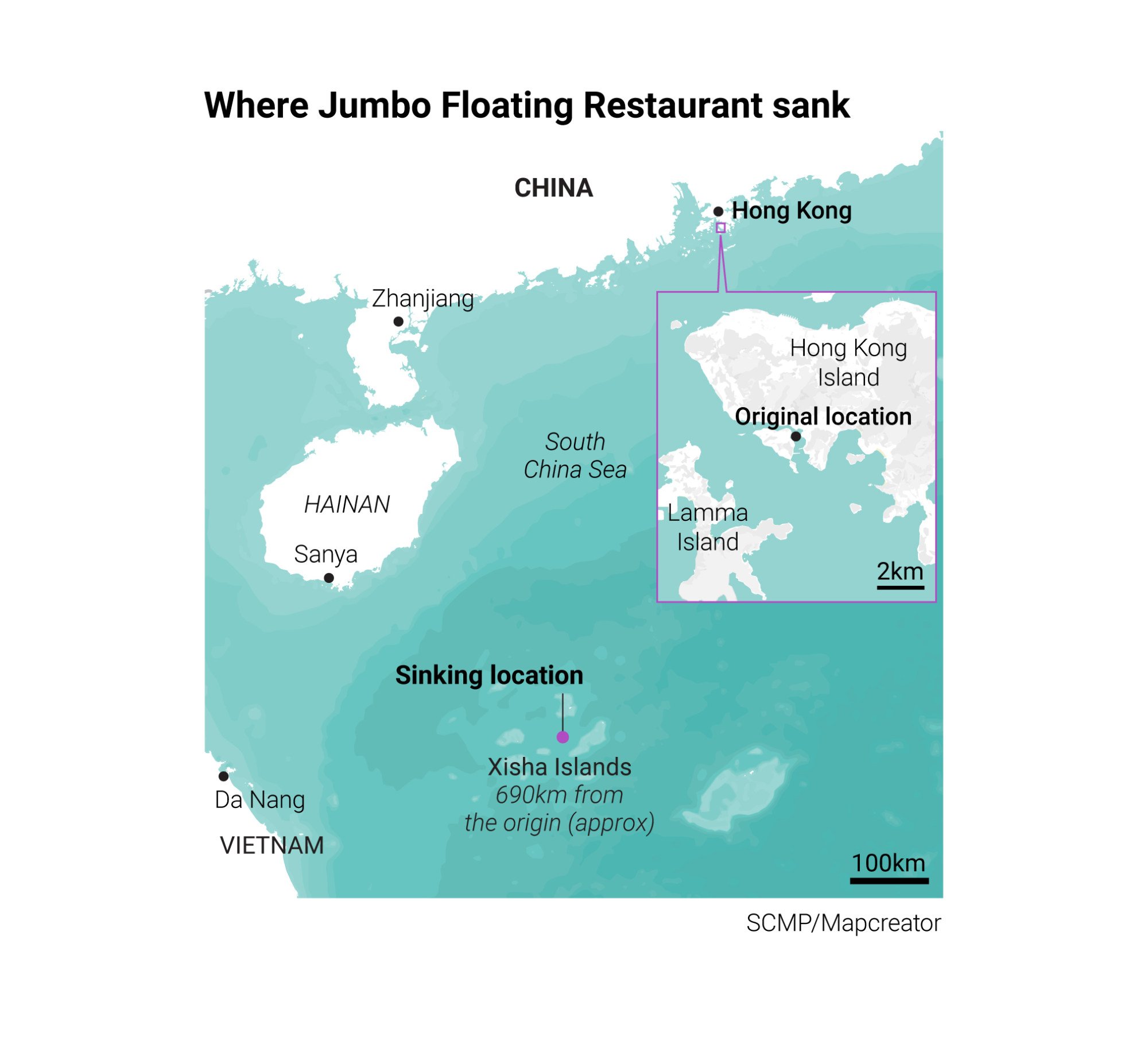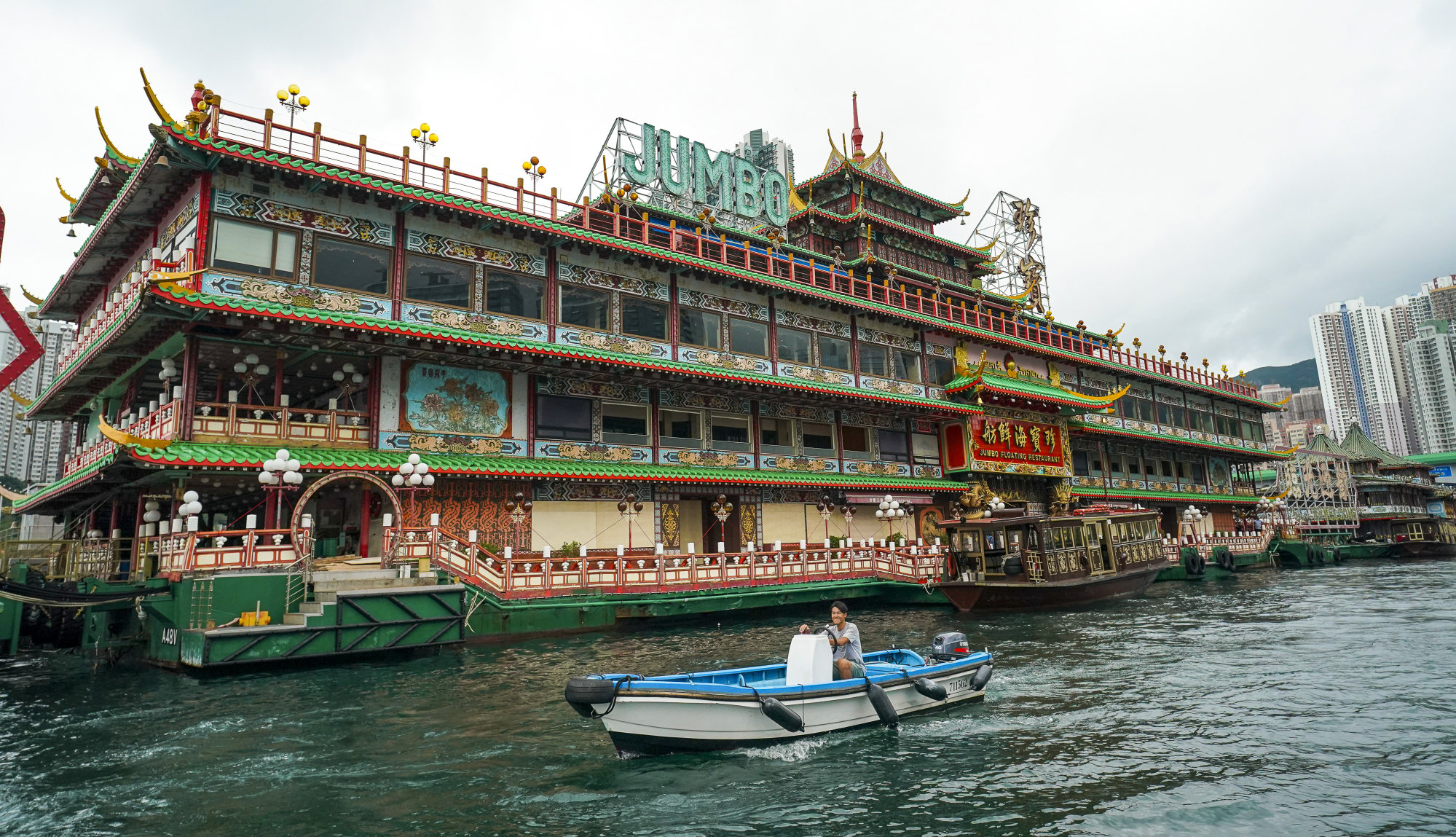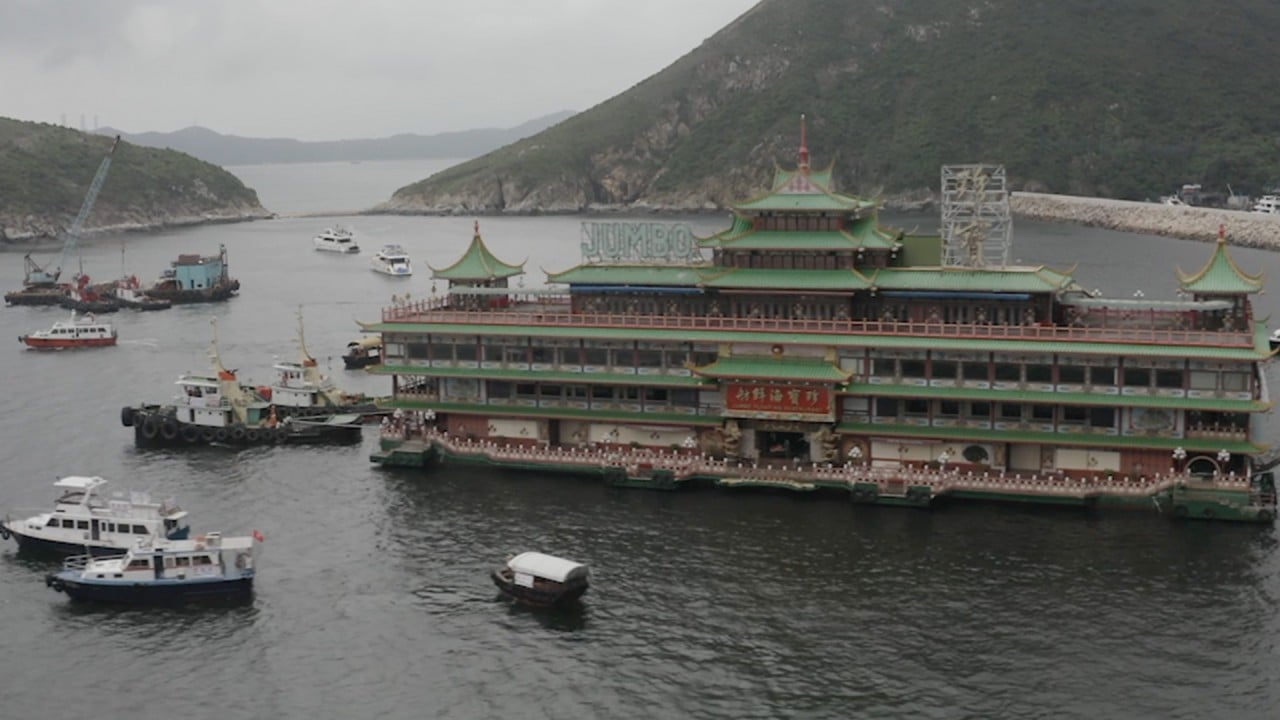
Hong Kong maritime authorities request report from owner after Jumbo Floating Restaurant sinks in South China Sea, reveal attraction was headed for Cambodia
- Politicians earlier urged government to reveal maritime assessment of vessel’s seaworthiness, sea routes and destination
- Expert says it is still possible to salvage wreckage but operation would cost at least HK$10 million
Hong Kong maritime authorities have asked the owner of the Jumbo Floating Restaurant to submit a report on its capsizing in the South China Sea, revealing they had earlier given approval for the vessel to be moved to Cambodia.
The Marine Department on Tuesday night said it had not been told of the sinking before the company announced it on Monday. Conspiracy theories have swirled that human error was a factor in the case.
What happened to Hong Kong’s Jumbo Floating Restaurant?
The department confirmed it had permitted the vessel to leave Hong Kong for Cambodia on June 14, after the owner appointed surveyors to conduct inspections to ensure it was suitable for the journey. The department said it would not monitor the vessel’s status after it had left Hong Kong waters.
Earlier in the day, politicians had pressed the government to investigate the case.
A maritime academic said it was still possible to salvage the wreckage but the operation would cost at least HK$10 million (US$1.27 million).
Hong Kong’s iconic Jumbo Floating Restaurant sinks in South China Sea
Jumbo encountered adverse conditions when it passed the Paracel Islands – known to China as the Xisha Islands – on Saturday afternoon, resulting in water entering the vessel and causing it to tip, its owner Aberdeen Restaurant Enterprises, a subsidiary of listed gaming firm Melco International Development, said on Monday.
Timothy Chui Ting-pong, deputy chairman of political party Third Side, urged the government to investigate the incident and release more information on the vessel’s departure.
“We feel pity about this incident … We call on the government to reveal whether marine officials had already got hold of its destination and the sea routes, and to probe why such a structure with high heritage value would sink into the deep sea,” Chui said, adding the party had issued a letter to the effect.
“The government should let us know what marine officials’ assessment of its departure was, such as whether the ship was fit to set sail to its destination.”

Chui said the government should also examine whether enough had been done to save the sinking ship, whose operator announced last month plans to exit Hong Kong because of a lack of funds to keep the structure in good condition. Talks on continuing the struggling business as part of the Ocean Park resort also failed.
While there had been calls for the government to offer financial help to keep the restaurant afloat, at least until a permanent home was found, city leader Carrie Lam Cheng Yuet-ngor ruled it out.
Chui said: “I know that some investors had approached the government offering to invest in the ship. I don’t know why the government failed to retain it in Hong Kong.”
The sinking also sparked concern among Hongkongers, even as speculation ran rife that human factors were involved.
One internet user said the incident would serve as “the best deal for the owner” who stood to save millions of dollars in repair and maintenance fees every year, while others suggested “sea burial is the best cost-saving method”, and the sinking was a way to claim insurance for a “negative asset”.
A spokeswoman for the Observatory said based on its forecast of the conditions near the Paracel Islands on Saturday and Sunday, there were “moderate to fresh southerly winds” with occasionally strong winds, along with isolated showers and thunderstorms, while waves were up to three metres high.
The firm said the vessel had sunk 1,000 metres (3,300 feet) under the sea which made it “extremely difficult” to salvage. A spokesman from Aberdeen Restaurant Enterprises told the Post he had no information on the financial loss or whether a salvage operation would continue.
Professor Stephen Li Yiu-kwong, of the department of logistics and maritime studies at Polytechnic University, said the vessel was a big structure that would be easily affected by strong winds.
“I believe the owner had assessed its seaworthiness and the weather forecast before allowing it to depart from Hong Kong,” he said.
‘Great loss to Hong Kong’: iconic Jumbo Floating Restaurant leaves city
The company maintained that the trip had obtained the relevant approval, with marine engineers having inspected Jumbo’s hull and installing hoardings on the vessel before its departure.
Li said it was still feasible to salvage the wreckage but the cost would exceed HK$10 million and the owner was not obliged under international maritime law to retrieve the ship unless it had caused an obstruction at sea.
The owner could have used an open-deck barge to carry the vessel to its destination, which would have been safer but more costly, he added.
“Whether to use an open-deck barge was entirely a commercial decision,” he said.
Li said those who deliberately caused a ship to sink would face criminal liability.
An insurance agent, who spoke on condition of anonymity, questioned whether the restaurant was insured outside Hong Kong waters given the way it was towed out to the high seas, without the use of a semi-submerged barge.
“I can’t imagine any insurer covering all risks or its eventual total loss unless the owner paid a massive premium,” the agent said. “The owner did not want it to remain in Hong Kong because of the high costs of renewing a licence and insurance policy.”

Lo Kin-hei, chairman of the opposition Democratic Party, also urged Aberdeen Restaurant Enterprises to release more details of the incident.
“There are already many conspiracy theories. Some people say the restaurant could not have been towed so far in a week. Some also doubt if the weather around the Xisha area was that bad,” Lo said.
The company last month announced it would move the restaurant from Hong Kong waters because it could not afford maintenance costs, with millions of dollars spent annually on inspections and repairs to meet licensing and other requirements.
Why the lack of interest in preserving Hong Kong’s contemporary history?
The firm said the restaurant, which cost HK$32 million when it was built in the 1970s, was heading to Southeast Asia but refused to disclose the exact location.
In its heyday, the floating restaurant attracted celebrities from near and far, including Britain’s Queen Elizabeth and film stars such as Tom Cruise and Chow Yun-fat.
It also featured in films such as the James Bond movie The Man with the Golden Gun (1974), Jackie Chan’s The Protector (1985), Stephen Chow Sing-chi’s The God of Cookery (1996), Steven Soderbergh’s Contagion (2011) and Infernal Affairs II (2003).


